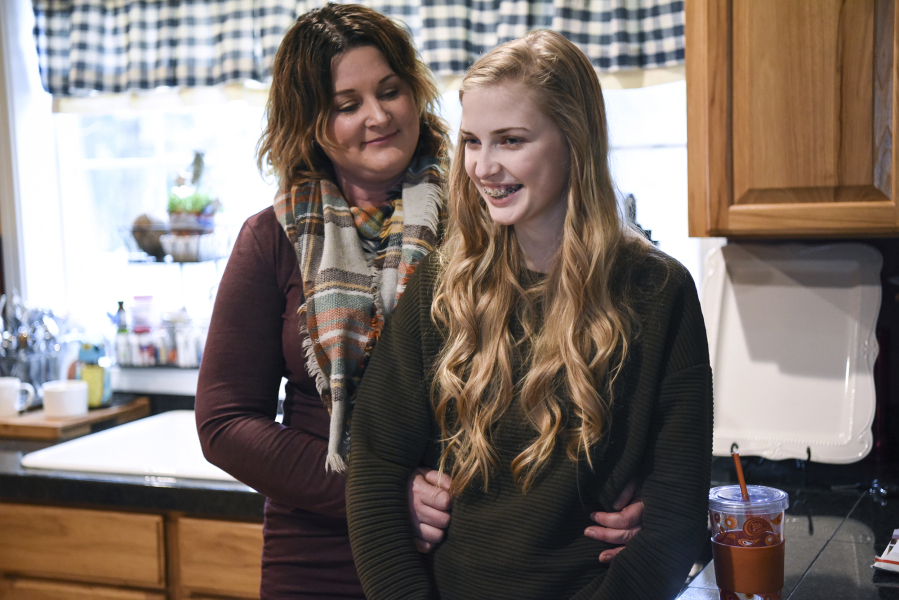By all outward appearances, Kaylin Coles is a normal, healthy teenager.
She’s tall and lean, with long blond hair. She rides horses and participates in horse shows. She’s artistic, with a bedroom full of art supplies and drawings. Never sick, it had been about two years since she last saw her doctor.
“She looks pretty healthy, so people don’t realize she’s sick,” said Amy Coles, Kaylin’s mom.
A little over a year ago, Amy and Corey Coles started noticing small changes with their daughter. Most notably: Kaylin was always thirsty.
She would drink glass after glass of water at dinner, sometimes stealing her mom’s glass when she emptied her own. Amy started noticing dirty cups in Kaylin’s bedroom and heard her daughter get up in the middle of the night to get water.
But it wasn’t until Kaylin began waking up every morning with dry heaves that Amy and Corey knew something was really wrong.
Kaylin saw her nurse practitioner, who immediately ordered blood work. Kaylin’s labs came back off the charts. She had virtually no vitamin D or calcium in her system. Her parathyroid hormone levels were sky high.
“That was a red flag,” Amy said.
An endocrinologist at Randall Children’s Hospital at Legacy Emanuel in Portland diagnosed Kaylin with a genetic disorder related to her parathyroid. She would need daily medication, but the condition was manageable.
A few days later, at an appointment with a nephrologist, the family received bad news.
“She told us it wasn’t what the endocrinologist said,” Amy said. “Her kidneys were failing.”
“We weren’t expecting that,” Corey added.
Amy and Corey have no family history of kidney disease, and doctors have no explanation as to why Kaylin, who turned 13 years old just days before her diagnosis, is in chronic kidney failure. A genetic test that could determine the cause has been denied by their insurance companies as an “investigative” procedure and, therefore, not covered.
When Kaylin was diagnosed in May, her kidneys were functioning at just 30 to 35 percent. The goal since then has been to slow the decline as much as possible in order to prolong the need for a transplant. In November, after days of testing at Seattle Children’s Hospital, Kaylin was added to the transplant list. Her position on the list is currently on hold, since her kidney function hasn’t declined much in the past year.
“She’s fairly stable,” Amy said.
That’s due to Kaylin’s altering her diet to one low in phosphorus and taking “binder” pills that attach to the phosphorus and remove it from her system. She also needs daily vitamins and regular injections to boost her red blood cell counts.
Typically, patients will need dialysis once their kidney function is down to 15 to 20 percent. Amy and Corey hope to find a living donor before Kaylin reaches that point so she can avoid dialysis.
And they may not have to look for a donor much longer. Corey is in the second phase of testing and should know within the next few months if he can donate a kidney to his daughter.
After the transplant, Kaylin will remain in Seattle for about six weeks to recover and be monitored by doctors. She’ll undergo blood tests three times a week and take a variety of medications, including anti-rejection drugs and steroids. Eventually, she’ll need only the anti-rejection medication.
But this won’t be Kaylin’s only transplant. Kidneys from living donors last only about 15 years.
“That blew me back,” Corey said. “I thought you get a transplant and you’re good.”
For now, however, the Battle Ground family is focused on finding Kaylin a donor and raising money to offset costs not covered by their health insurance. They’ve teamed up with the Children’s Organ Transplant Association to set up a donation page and organize fundraisers. They have an event at Sweet Tomatoes planned for Thursday and a dinner and dance scheduled for March 11.
Kaylin’s doctors are monitoring her kidney function with monthly blood tests. When Kaylin was diagnosed with kidney failure, doctors told her it could be one to two years before she needs a transplant.
Kaylin still drinks a lot of water — often about 120 ounces per day — and tires much easier than she used to. But she has been able to continue riding horses and attending classes at Tukes Valley Middle School.
“She’s handled it amazingly well,” Amy said.




